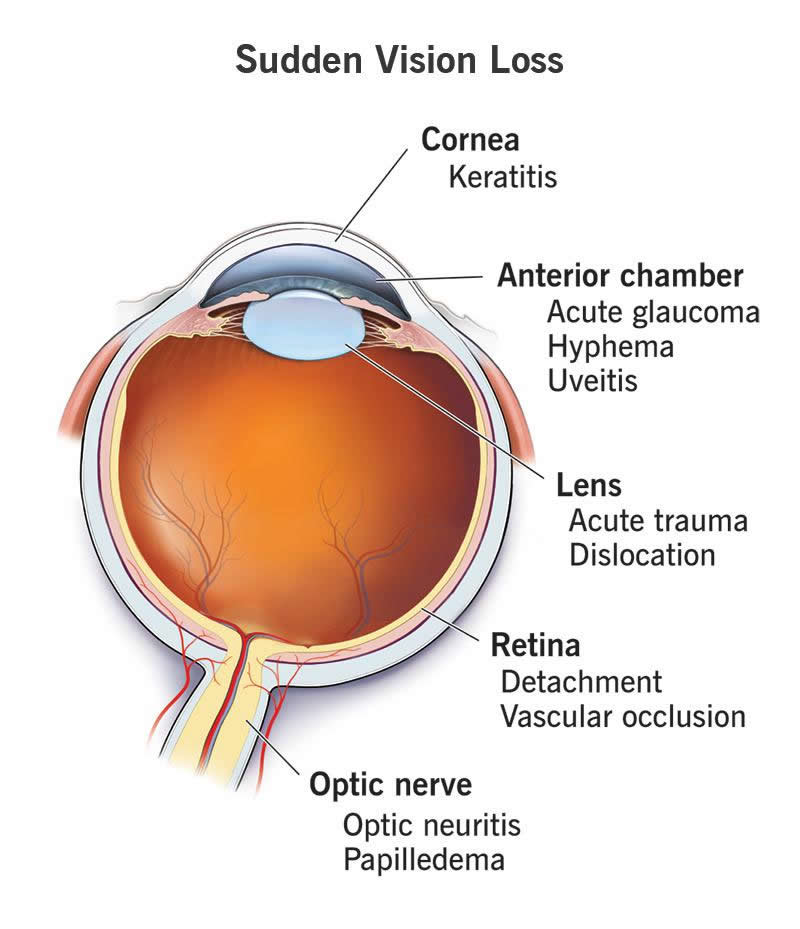Sudden Vision Loss
Sudden loss of vision, which can happen in minutes or over a few days, is a medical emergency and requires immediate treatment. Many conditions can cause sudden vision loss. Treatment will depend on the cause.
Overview

What is sudden vision loss?
Sudden vision loss is a medical emergency. Sudden vision loss means a swift, usually unexpected, loss of the ability to see well or to see at all. It can happen in seconds, minutes or even over a few days. It can happen in one eye or both eyes. You can lose all vision or vision in one part of your visual field, such as a loss of central vision.
You may wonder what the difference is between sudden vision loss and gradual vision loss. Gradual vision loss usually happens over months or years.
Possible Causes
Why did I have a sudden loss of vision?
Vision loss can happen because of problems at any point in the visual process. The process involves your eye sending signals to your brain to create images. Issues with your eyes, nerves and brain can all result in sudden vision loss.
What are the most common causes of a sudden loss of vision?
Common causes of a sudden loss of vision include:
- Acute glaucoma.
- Endophthalmitis, an inflammation of the inside of your eye usually caused by infection.
- Eye injury.
- Giant cell arteritis, also called temporal arteritis.
- Iritis, also called anterior uveitis.
- Ocular migraine.
- Optic neuritis.
- Retinal artery occlusion or retinal vein occlusion, which refers to a blockage in the blood flow to or from your retina.
- Retinal detachment.
- Infection of your retina.
- Stroke or transient ischemic attack.
- Vitreous hemorrhage (blood leaking into or near the vitreous humor).
- Age-related macular degeneration.
How will a healthcare provider determine what’s causing a sudden vision loss?
A provider will typically begin by asking about what happened when you first noticed the loss of vision. They’ll also ask about your medical history and other symptoms you may have, including:
- What other medical conditions do you have?
- What were you doing when you lost vision?
- Do you also have pain in your eye?
- Did you injure your eye? How did you injure your eye?
- Does light bother your eyes?
- Do you see floaters?
- Did your vision return quickly?
The provider may ask you to have some or all of these tests:
- A physical exam.
- An eye exam.
- Blood tests. These include those that measure inflammation (sed rate, C-reactive protein) and the number of platelets in your blood.
- Imaging tests, such as ultrasounds or magnetic resonance imaging (MRI).
- Neurological testing.
Care and Treatment
How is sudden vision loss treated?
Sudden vision loss is a medical emergency. Call 911 or go to an emergency room immediately.
Treatment will depend on what’s causing your vision loss. For instance, your provider may treat you with:
- Medication in the form of eye drops, tablets or injections.
- Steroids to treat inflammation.
- Anti-infective medications to treat infections.
- Surgery.
You need fast diagnosis and treatment to have the best chance of getting your vision back.
How can sudden vision loss be prevented?
You may be able to reduce your risk of sudden vision loss if you do certain things to protect your vision, including:
- Wearing safety equipment when needed, such as while working or participating in sports.
- Practicing good hand hygiene (washing your hands well to prevent infection).
- Not touching your eyes.
- Following your provider’s instructions on safely wearing and cleaning contact lenses to avoid infection.
- Managing any chronic health conditions, like diabetes or high blood pressure.
When To Call the Doctor
When should sudden vision loss be treated by a healthcare provider?
A healthcare provider should always evaluate and treat a sudden loss of vision. If you lose vision suddenly, go to the emergency room immediately.
A note from Wockr
If you suddenly lose your vision, you need to get immediate medical help. This is true if you lose vision in part of your field of vision, in one eye or both eyes. And you need to get help whether you have pain in your eye or not. It’s scary, but the situation can often improve as long as you get medical attention quickly.